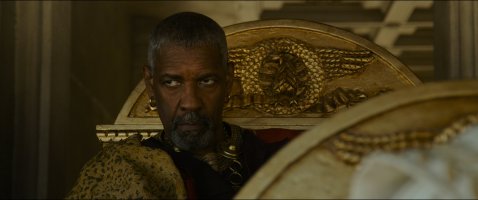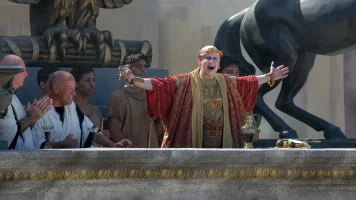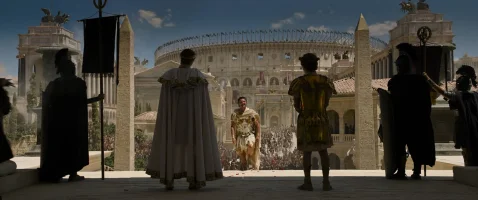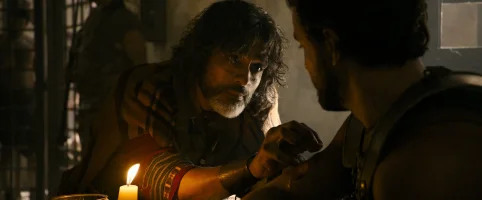Official Review
It's noteworthy that the busy filmmaker Ridley Scott has crafted only four sequels in his extensive career: Hannibal, Prometheus, Alien: Covenant, and now Gladiator II. His two Alien follow-ups remain controversial, with some viewing them as unnecessarily complicating the original's straightforward, fierce appeal. Gladiator II avoids this pitfall of overcomplication. In fact, it's a fairly straightforward retelling of Gladiator's story of political turmoil viewed through a warrior's eyes. Yet, as history often shows, classic tales can still resonate when presented with flair. Gladiator II moves with surprising agility, largely due to its eager cast. Scott's modern touch on the historical action framework he mastered twenty years ago transforms this unexpected sequel into a true blockbuster champion.
Similar to Maximus Decimus Meridius before him, the banished heir Lucius (Paul Mescal) finds himself under Roman control and forced into gladiatorial combat. Lucius' frustration with the system clashes with his loyalty to the ideals of strength and honor championed by Maximus, offering Mescal rich material to work with in Gladiator II's first half – and helps set his heroism apart from Maximus'. He enters the arena seeking vengeance against Acacius (Pedro Pascal), a beloved general who has conquered Lucius' adopted homeland. However, the narrative quickly shifts Lucius' personal motivations to use him as a symbol for a younger generation tired of old traditions. Larger political schemes increasingly unfold around the colosseum games held in Acacius' honor, and Mescal capably shoulders the weight of that brewing revolution. He allows just enough humility and charm to shine through early on, and by the time the character becomes more of a vessel for Gladiator II's thoughts on leadership, he feels deserving of the role.
Maximus' influence looms large over Gladiator II, but rather than fully mythologizing him, Scott wisely grounds the character's positive impact in the memories of those who witnessed his journey – specifically, Lucius and his mother Lucilla (Connie Nielsen). This approach mostly works well, but it does make Acacius, a statesman-like figure very much in Maximus' mold, stand out somewhat awkwardly. He serves as a reminder that there's still some reason at the highest levels of Roman authority. However, with Lucius already following Maximus' path, Acacius' embodiment of Maximus' ideals feels somewhat redundant.
Maximus' triumph over Commodus in the arena 16 years ago should have ushered in a new golden age for Rome. Instead, the resulting power vacuum left the city even more paranoid and dangerous – a disappointing outcome that Gladiator II quickly glosses over. The Senate, weakened by the Emperors' relentless pursuit of conquest, is now filled with ineffective old-timers like Gracchus (Derek Jacobi). However, Lucilla has found her strength in the years since Maximus' sacrifice. She's paid for her brother Commodus' crippling of Rome by staying close to power and advocating for justice. Nielsen's portrayal adds significant depth to a character who seemed somewhat peripheral in the first film.
Despite Rome's sorry state, Scott manages to inject some fun into the proceedings. Rather than getting bogged down in the empire's troubles, the director often finds humor in them. Gladiator II's frequent tongue-in-cheek moments are a pleasant surprise, given the familiar plot. Even obvious shots of eavesdropping servants feel like intentional nods to the audience. While the sequel sticks closely to the original's structure, Scott's lighter touch adds spice to scenes and plot developments that might otherwise feel repetitive.
This aspect of Gladiator II is most evident in the current guardians of Marcus Aurelius' "dream of Rome": co-emperor brothers Geta (Joseph Quinn) and Caracalla (Fred Hechinger). Their unpredictable mood swings and bloodthirsty whims make these nightmarish little tyrants worthy successors to Joaquin Phoenix's supremely simpering Commodus. Their antics verge on slapstick, but Quinn and Hechinger's volatile and off-putting performances never let you forget the threat Geta and Caracalla pose to Rome's future. While they may lack the dramatic weight of Phoenix's scheming villain, they make up for it with excessive eye shadow and a dress-wearing monkey sidekick. In Gladiator II's world, that's a fair trade-off, especially since Scott finds balance elsewhere.
A deeper look at power dynamics unfolds through Macrinus (Denzel Washington), a former slave turned gladiator trainer who now sways city politics. As the story progresses, this aspect of his character becomes more striking, with Washington delivering an electrifying performance. (Mescal shines brightest when matching the Oscar winner's intensity.) Macrinus constantly strategizes to advance his cause, and whether through hushed threats or charismatic displays, Washington commands every scene with perfect timing. The uncertainty of whether Macrinus will use his influence to help or harm Lucius shifts throughout, making him as formidable as any arena opponent and a key plot device when the emperors' chaotic rule becomes too predictable.
Gladiator II strikes a good balance between political intrigue and arena action, with Scott maintaining a brisk pace throughout the two-and-a-half-hour runtime. The arena scenes, serving as the movie's pulse, lean more towards spectacle than substance. Armed with two decades of VFX advancements, Scott delivers larger-than-life spectacles. A fight with angry baboons and full-scale naval battles within the Colosseum (surprisingly, a historical fact) surpass the original film's achievements but don't always hit the mark. While visually distinct, these battles feel somewhat rushed and less impactful than the more visceral encounters in the first film. Gladiator II's one-on-one fights – like Lucius' forced swordfight at the emperors' command – often pack more punch than, say, a CGI rhino rampaging through the arena. However, the games' mix of excess and brutality serves its main purposes: highlighting the stakes of Lucius' continued success and showing how messed up it is to measure that success by one's ability to kill others.
Verdict
Gladiator II discovers valor and dignity in the well-trodden path of its forerunner. Paul Mescal shines in the burdened-hero role, matching wits with the delightfully unhinged Joseph Quinn and Fred Hechinger, as well as Denzel Washington, whose unpredictable Macrinus seems to shout "ARE YOU NOT AMUSED" at viewers every moment he's visible. Ridley Scott skillfully balances Gladiator II's action and drama, and while revisiting familiar territory, Scott's willingness to lighten the mood gives Gladiator II its distinct flavor. The murky political struggle for Rome's destiny may prove more consistently engaging than the fantastical clashes in the Colosseum, but both emphasize the value of courage and restraint in chaotic times. They do so in true blockbuster fashion: with a group of sword-wielding, sandal-clad men working together to avoid being trampled by a massive rhino while a deranged Emperor, monkey on shoulder, howls from the prime seats.





